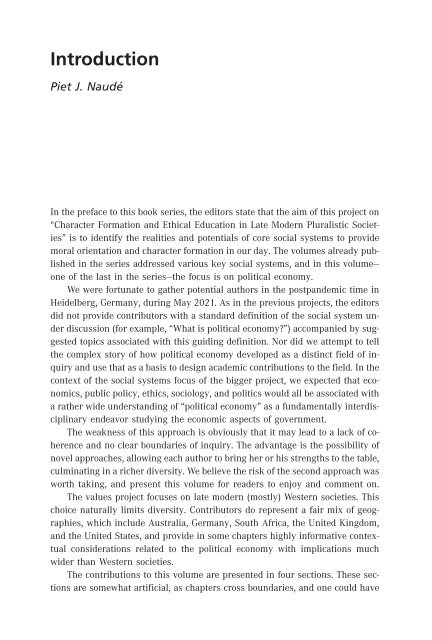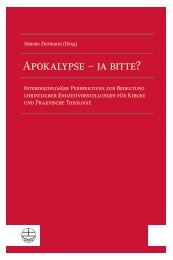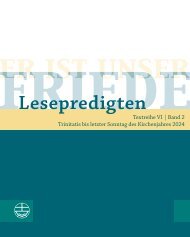Piet Naudé | Michael Welker | John Witte, Jr. (Eds.): The Impact of Political Economy (Leseprobe)
In our late modern pluralistic societies, there are tensions and complementarities between a plurality of individual and social claims and activities to shape societal life and a constructive pluralism of what is known as social systems. The latter provide normative codes and powers emanating from the areas of law, religion, the family, the market, the media, education, academic research, health care, defense and politics. A better understanding and steering of this complex division of powers is crucial for the common good and for freedom and peace. In this volume, a multi-disciplinary team of experts from Germany, Italy, Australia, the UK, the USA, and South Africa bring their conceptual, empirical and historical insights to bear in three broad sections: »The moral dimension of social systems«; »The interaction of religion, law and education with political systems«; and »The moral (mal)-formation evident in case studies on the global financial crisis and social media«.
In our late modern pluralistic societies, there are tensions and complementarities between a plurality of individual and social claims and activities to shape societal life and a constructive pluralism of what is known as social systems. The latter provide normative codes and powers emanating from the areas of law, religion, the family, the market, the media, education, academic research, health care, defense and politics. A better understanding and steering of this complex division of powers is crucial for the common good and for freedom and peace.
In this volume, a multi-disciplinary team of experts from Germany, Italy, Australia, the UK, the USA, and South Africa bring their conceptual, empirical and historical insights to bear in three broad sections: »The moral dimension of social systems«; »The interaction of religion, law and education with political systems«; and »The moral (mal)-formation evident in case studies on the global financial crisis and social media«.
Create successful ePaper yourself
Turn your PDF publications into a flip-book with our unique Google optimized e-Paper software.
Introduction<br />
<strong>Piet</strong> J. <strong>Naudé</strong><br />
In the prefacetothis book series, the editors state that the aim <strong>of</strong> this project on<br />
“Character Formation and Ethical Education in Late Modern Pluralistic Societies”<br />
is to identify the realities and potentials <strong>of</strong> core social systems to provide<br />
moral orientation and character formation inour day.<strong>The</strong> volumes alreadypublished<br />
in the series addressed various key social systems, and in this volume—<br />
one <strong>of</strong> the last in the series—the focus is on political economy.<br />
We were fortunate to gather potential authors in the postpandemic time in<br />
Heidelberg, Germany, during May 2021. Asinthe previous projects, the editors<br />
did not provide contributors with astandard definition <strong>of</strong> the social system under<br />
discussion (for example, “What is political economy?”) accompanied by suggested<br />
topics associated with this guiding definition. Nor did we attempt totell<br />
the complex story <strong>of</strong> how political economy developed asadistinct field <strong>of</strong> inquiry<br />
and use that as abasis to design academic contributions to the field. In the<br />
context <strong>of</strong> the social systems focus <strong>of</strong> the bigger project, we expected that economics,public<br />
policy, ethics, sociology, and politics would all be associated with<br />
arather wide understanding <strong>of</strong> “political economy” as afundamentally interdisciplinary<br />
endeavor studying the economic aspects <strong>of</strong> government.<br />
<strong>The</strong> weakness <strong>of</strong> this approach is obviously that it may lead to alack <strong>of</strong> coherence<br />
and no clear boundaries <strong>of</strong> inquiry. <strong>The</strong> advantage is the possibility <strong>of</strong><br />
novel approaches, allowing each author to bring her or his strengths to the table,<br />
culminating in aricher diversity. We believe the risk <strong>of</strong> the second approach was<br />
worth taking, and present this volume for readers to enjoy and comment on.<br />
<strong>The</strong> values project focuses on late modern (mostly) Western societies. This<br />
choice naturally limits diversity. Contributors do represent afair mix <strong>of</strong> geographies,<br />
which include Australia, Germany, South Africa, the United Kingdom,<br />
and the United States, and provide in some chapters highly informative contextual<br />
considerations related to the political economy with implications much<br />
wider than Western societies.<br />
<strong>The</strong> contributions to this volume are presented infour sections. <strong>The</strong>se sections<br />
are somewhat artificial, as chapters cross boundaries, and one could have
















